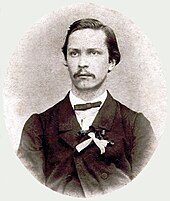Mykola Lysenko

Mykola Witalijowytsch Lysenko ( Ukrainian Микола Віталійович Лисенко ., Scientific transliteration Mykola Vitálijovyč Lysenko , Russian Николай Витальевич Лысенко Nikolai Vitalievich Lysenko ; born March 10 . Jul / 22. March 1842 greg. In Grinki in Kremenchuk , Poltava Governorate , Russian Empire ; † 24 October. jul. / 6. November 1912 greg. in Kiev , Russian Empire) was a Ukrainian Composer , pianist and conductor .
life and work
Lysenko grew up in a family that belonged to the Ukrainian baristocracy. His father, Vitaly Romanovich Lyssenko, was a colonel in the Russian imperial cuirassier regiment . Mykola Lyssenko's mother taught him French and the Russian poet Afanassi Fet taught him Russian.
Lyssenko studied biology at the Kharkov University , at the same time he took private music lessons. He continued his biology studies at Kiev University and finished it in 1865. From this time Mykola began to collect and harmonize Ukrainian folk songs. As a scholarship holder of the Russian Music Society, he studied music at the Leipzig Conservatory from 1867 to 1869 .
In the mid-1870s, Lysenko came to Saint Petersburg to study with Nikolai Rimsky-Korsakov . His openly declared attachment to Ukrainian culture often brought him harassment. He supported the Russian Revolution of 1905 and was jailed in 1907. In 1904 Lyssenko founded his own school in Kiev (since 1913 - Lyssenko School). In 1908 he was elected chairman of the Ukrainian Club in Kiev. He died in Kiev in 1912 and was buried there in the Baikowe Cemetery.
Tchaikovsky liked the opera Taras Bulba based on Nikolai Gogol with a Ukrainian libretto by Mychajlo Staryzkyj , which is why he wanted to perform it in Moscow. Lysenko, however, stipulated that the performance should be in Ukrainian.
His opera Natalka-Poltavka was created as a setting of the story by Ivan Kotlyarevsky . Lyssenko composed a total of nine operas and three children's operas (all three libretti by Dniprowa Tschajka ) and many songs to the texts of Heinrich Heine in Ukrainian translations as well as Ukrainian poets. The setting of Taras Shevchenko's poems occupied a special place in his works. He was particularly fascinated by Shevchenko's collection of poems, Kobsar , so that he composed the music for a total of 82 texts by Shevchenko.
Lysenko dealt scientifically with the folk music of Ukrainian traveling musicians, such as Ostap Weressai , Pawlo Bratytsia and Opanas Slastion , as well as with Ukrainian musical instruments.
family
Lysenko was the cousin and brother-in-law of the cultural activist and writer Mychajlo Staryzkyj . His two nieces and one great niece were victims of the Stalinist terror as representatives of the "executed rebirth" (ukr. Розстріляне відродження ):
- Lyudmyla Staryzka-Tschernjachiwska (1868–1941) writer, died during deportation
- Oksana Steschenko (Окса́на Миха́йлівна Стеше́нко, 1875–1942) writer, died in the Gulag .
- Weronika Tschernjachiwska (Вероні́ка Олекса́ндрівна Черняхі́вська, 1900–1938) poet, executed.
- His son Ostap (1885–1968) was a musicologist. Wrote, among other things, "Memories of M. Lyssenko".
- His daughter Ariadna ("1921) pianist
Further line:
- Daughter Marjana (1887–1946) pianist
- Their son Witali (1941–1999?) And
- Grandson Mykola (* 1971) are conductors.
Literature (selection)
- Taras Filenko, Tamara Bulat: The World of Mykola Lysenko: Ethnic Identity, Music, and Politics in Nineteenth-Century Ukraine . Ukraine Millennium Foundation (Canada), 2001, ISBN 966-530-045-8 .
- Lubomyra Jarosewytsch: Lysenko
- Lysenko, OMV Lysenko: Spohady syna (Kyiv 1959, 1966)
- Rudnyts'kyi, A. Ukraïns'ka muzyka (Munich 1963)
- Zahaikevych, M. (ed). Mykola Lysenko: Borets 'za narodnist' i realizm u mystetstvi (Kyiv 1965)
- Lysenko, O. (ed). MV Lysenko u spohadakh suchasnykiv (Kyiv 1968)
- Vasylenko, Z. Fol'klorystychna diial'nist 'MV Lysenka (Kyiv 1972)
- Bulat, TM Lysenko (Kyiv 1973)
- Arkhimovych, L .; Hordiichuk, M. Mykola Vitaliiovych Lysenko: Zhyttia i tvorchist ', 3rd rev ed (Kyiv 1992)
Web links
- Lyssenko String Quartet in D minor
- Ukrainian Art Song Project ( Memento from August 20, 2008 in the Internet Archive )
- Entry on Mykola Lysenko in the Encyclopedia of the History of Ukraine (Ukrainian)
- Entry on Mykola Lysenko in the Ukrainian Soviet Encyclopedia (Ukrainian)
Individual evidence
- ↑ a b Article on Mykola Lyssenko in the Encyclopedia of Ukraine (English)
- ↑ a b Nikolay Lysenko, Ukrainian composer: biography, creativity .
- ↑ Kyiv: Encyclopedia Reference / Edited by AB Kudrytskoho. - K: Home Edition of the Ukrainian Soviet Encyclopedia, 1981.
- ^ Philipp Hofeneder: The Ukrainian People's Theater. Between linguistic stylization and popular education. In: Zeitschrift für Slavische Philologie , Vol. 68, No. 2, Universitätsverlag Winter, Heidelberg 2011, pp. 271–303, accessed on February 13, 2019.
- ↑ ЛИ́СЕНКО Микола Віталійович. Entry on Mykola Witalijowytsch Lysenko in the Encyclopedia of Modern Ukraine . From ESU.com.ua (Ukrainian), accessed February 13, 2019.
- ↑ http://esu.com.ua/search_articles.php?id=54892
- ↑ http://esu.com.ua/search_articles.php?id=54827
- ↑ http://esu.com.ua/search_articles.php?id=54863
- ↑ http://esu.com.ua/search_articles.php?id=54837
- ↑ http://esu.com.ua/search_articles.php?id=54865
| personal data | |
|---|---|
| SURNAME | Lyssenko, Mykola |
| ALTERNATIVE NAMES | Lyssenko, Mykola Vitaliyovich (full name); Ли́сенко, Мико́ла Віта́лійович (Ukrainian) |
| BRIEF DESCRIPTION | Ukrainian composer, pianist and musicologist |
| DATE OF BIRTH | March 22, 1842 |
| PLACE OF BIRTH | Hrynky near Kremenchuk , Poltava Governorate , Russian Empire |
| DATE OF DEATH | November 6, 1912 |
| Place of death | Kiev , Russian Empire |
